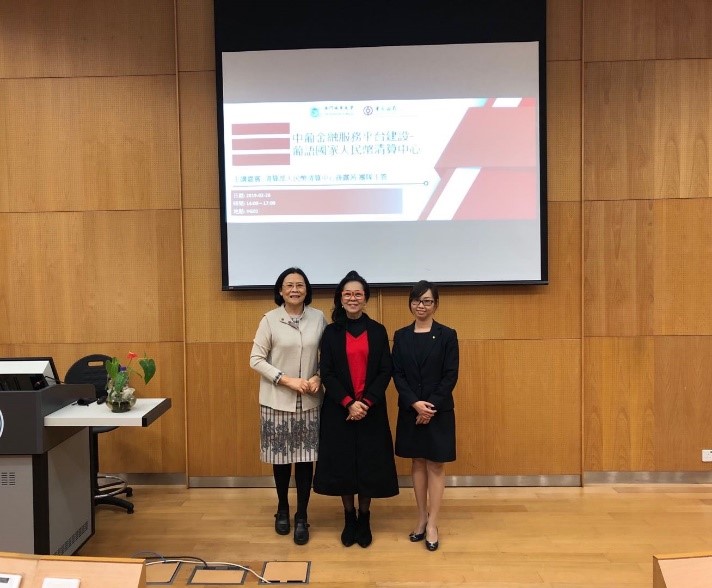.jpg)
On 26 February 2019, Director Chen Fen of Bank of China Macau Branch and Ms Sun Luxi, team leader of the RMB Clearing Centre of the Clearing Department, visited the Faculty of Finance of CityU and gave a fascinating thematic academic lecture and seminar to the teachers and students.

Under the initiative of the Monetary Authority of Macao to develop Macao's characteristic finance and green finance, from the perspective of the importance of establishing diplomatic ties and trade relations between China and Portugal, Ms Sun explained to the audience the necessity of developing a financial services platform and the typical role of Bank of China Macau Branch in the process. According to Ms Sun, the key is to build a RMB clearing centre that supports fund transactions between Portuguese-speaking countries and China with Macao as the foothold, and the core connotation is to cater for the RMB internationalization trend. RMB internationalization refers to the process where RMB becomes a universally recognized invoicing, settlement and reserve currency in the world so that it can cross national borders and circulate overseas, after which, RMB will have three major functions, namely the main payment currency for international trade, the main international investment and financing currency, and the main international reserve currency. The figure below is a review of the RMB internationalization process.
.jpg)
The thematic seminar focused on the special drawing rights (SDR), an international type of monetary reserve currency, also called paper gold. Its value is currently determined by a basket of reserve currencies consisting of the US dollar, the euro, the Chinese renminbi, the Japanese yen, and the British pound sterling. The international status of RMB is of great importance. In order to make capital financing more convenient, the "Bond Connect" was officially launched in 2017. The "Bond Connect" is a brand new plan for the interconnectivity cooperation between the Mainland and Hong Kong bond markets. It allows Mainland and foreign investors to buy and sell bonds in the other's market through the infrastructure connection established in Hong Kong. The "Northbound Trading" was launched on 3 July 2017 to provide more international investors with a channel to participate in the interbank bond market in Mainland China. The "Bond Connect" has promoted the evolution of RMB from an invoicing currency to a settlement currency and then to a reserve currency, and has advanced the virtuous cycle of RMB liquidity and offshore RMB. With RMB as an investment and financing currency, in January 2019, the total RQFII investment quota reached RMB648,672 million, and in December 2018, foreign institutions increased their holdings of RMB bonds by RMB83.8 billion. As a payment currency, RMB remained fifth in international payments in December 2018; as a reserve currency, RMB accounted for 1.8% of global foreign exchange reserves in the third quarter of 2018.
Statistics and research data show the strong vitality of RMB. Can Macao participate in the settlement of RMB transactions under the care of national policies? What are the characteristics of Macao itself? From a historical perspective, Macao has a longstanding relationship with Portuguese-speaking countries. Firstly, as Macao was a Chinese territory under Portuguese control, Portuguese is one of the official languages of Macao. Their legal systems and accounting systems are related. Considering the total volume of bilateral trade between China and Portuguese-speaking countries, a RMB clearing centre for Portuguese-speaking countries may be established.
From 2015 to 2018, the total trade volume between China and Portuguese-speaking countries maintained constant growth (the unit was in USD100 million). The trade between China and Portuguese-speaking countries calls for a unified settlement platform to quickly and efficiently handle the foreign exchange settlement of fund transactions, with RMB as the clearing currency. What products and services can the RMB clearing bank in Macao provide?
What challenges does the financial services platform based on RMB clearing face? For example, some Portuguese-speaking countries have high business risks, and RMB has not been able to be directly exchanged with the currencies of Portuguese-speaking African countries.
In order to help the teachers and students use their financial expertise skilfully, Ms Sun asked all the students in the PhD in Finance program to freely form four groups. In each group, two students represented the two trading parties from China and Portuguese-speaking countries respectively, while the others offered suggestions on "how to further promote platform development" at the business level, the State level and the SAR Government level respectively. By way of case assumption making and role playing, all students participated and had intense discussions. The teachers and students acted naturally and learned to apply their knowledge. The students studied the classic case of Portuguese-speaking countries reselling red wine to Mainland China, and considered the capital financing of the entire supply chain and the role of Bank of China Macau Branch as a bridge. In the end, Associate Dean Khong Yueng Wah, Director Chen Fen and Ms Sun commented on the students' performances and opinions and offered guidance. The teachers and students learned happily in a pleasant atmosphere.


